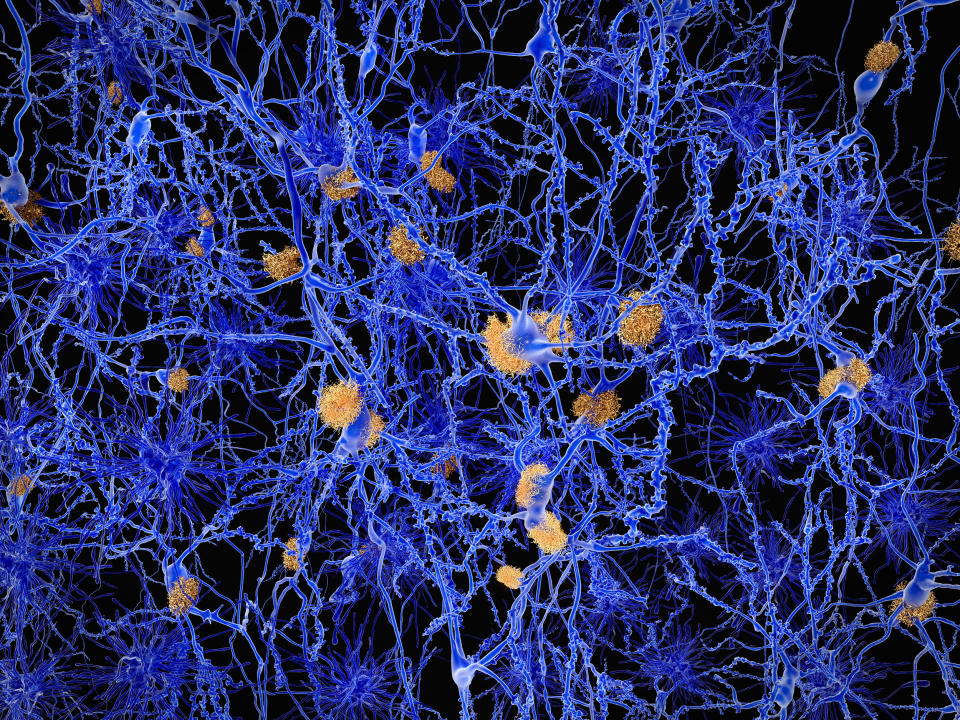Can I prevent Alzheimer's disease? Neurologist answers common questions
Early detection is said to be the best defense against illness. That is especially true when you are dealing with something like Alzheimer's disease, which currently has no cure.
In honor of the 5.8 million Americans living with the disease, Dr. John Torres, an NBC News medical correspondent, sat down with Harvard neurologist Rudolph Tanzi to discuss common questions about Alzheimer's and offer tips on how to protect yourself against the deadly disease.
1. What’s Alzheimer’s? What’s the difference between Alzheimer’s and dementia?
"I like to say that dementia, if it was fruits, [if] all fruits are dementia, the most common fruit is like an apple, that’s Alzheimer’s," Tanzi explained. "So Alzheimer’s is a type of dementia, and 90 percent of the time we see dementia in the elderly, it’s Alzheimer’s. 10 percent is other causes."
According to the National Institute on Aging, Alzheimer's disease is defined as an irreversible, progressive brain disorder that slowly destroys memory and thinking skills. For most people, symptoms begin to appear in their mid-60s. Alzheimer's is the most common cause of dementia; dementia is defined as the loss of cognitive functioning.
2. What happens to the brain when you have Alzheimer's?
"Amyloid plaques are these like sticky bundles, like big boulders, in between the nerve cells. And they accumulate. ... And they cause the nerve cells to make something called tangles, these twisted filaments that choke the nerve cells from inside," Tanzi said.
"The good news is that you can live with a brain full of plaques and tangles and not get this disease until the third pathology shows up," he elaborated. "The brain’s very primitive immune system sees these plaques and tangles, sees a few nerve cells dying here and there, and then there’s inflammation, neuroinflammation. This is what then takes up 10 to 100 times more nerve cells. Then you go to dementia."

3. Does your diet matter when it comes to preventing Alzheimer's?
"(To help prevent Alzheimer's) the three biggies are sleep, diet, exercise," Tanzi said. "Try to get your eight hours of sleep, even if it’s not continuous. Exercise, we talked about how great exercise is for the brain. Diet, nothing beats the Mediterranean diet. ... The Mediterranean diet is a big emphasis on fiber, plant fiber, less red meat, more fish."
Related: To keep your brain sharp, load up on these foods.
4. Does blood pressure play a role in dementia and Alzheimer’s?
"Yeah, big time. One of the best things you can do to help reduce your risk is to keep track of your blood pressure because little mini-strokes that are unnoticed can cause injuries in the brain that over time can cascade into Alzheimer’s disease," Tanzi noted. "What’s good for your heart is good for your brain."
5. What can people do to try and prevent Alzheimer’s?
"I like to use the acronym SHIELD," Tanzi noted. "Shield your brain."
S = Sleep. "You get these cells called microglia, they’re like scrubby bubbles, and they get activated during deep sleep, so sleep’s very important," he said.
H = Handle stress. Tanzi's advice: Meditate, chill out, don’t worry so much.
I = Interaction. Spend time with your family and friends. Loneliness can be a risk factor for Alzheimer's.
E = Exercise. It's good for your body and your brain.
L = Learning new things.
D = Diet. As mentioned above, Tanzi recommends following a Mediterranean diet.
While all of this advice might seem overwhelming at first glance, approaching one change at a time could help make it feel more manageable. They're not major changes, but they could potentially have life-saving results.
These quotes have been edited for length and clarity.

